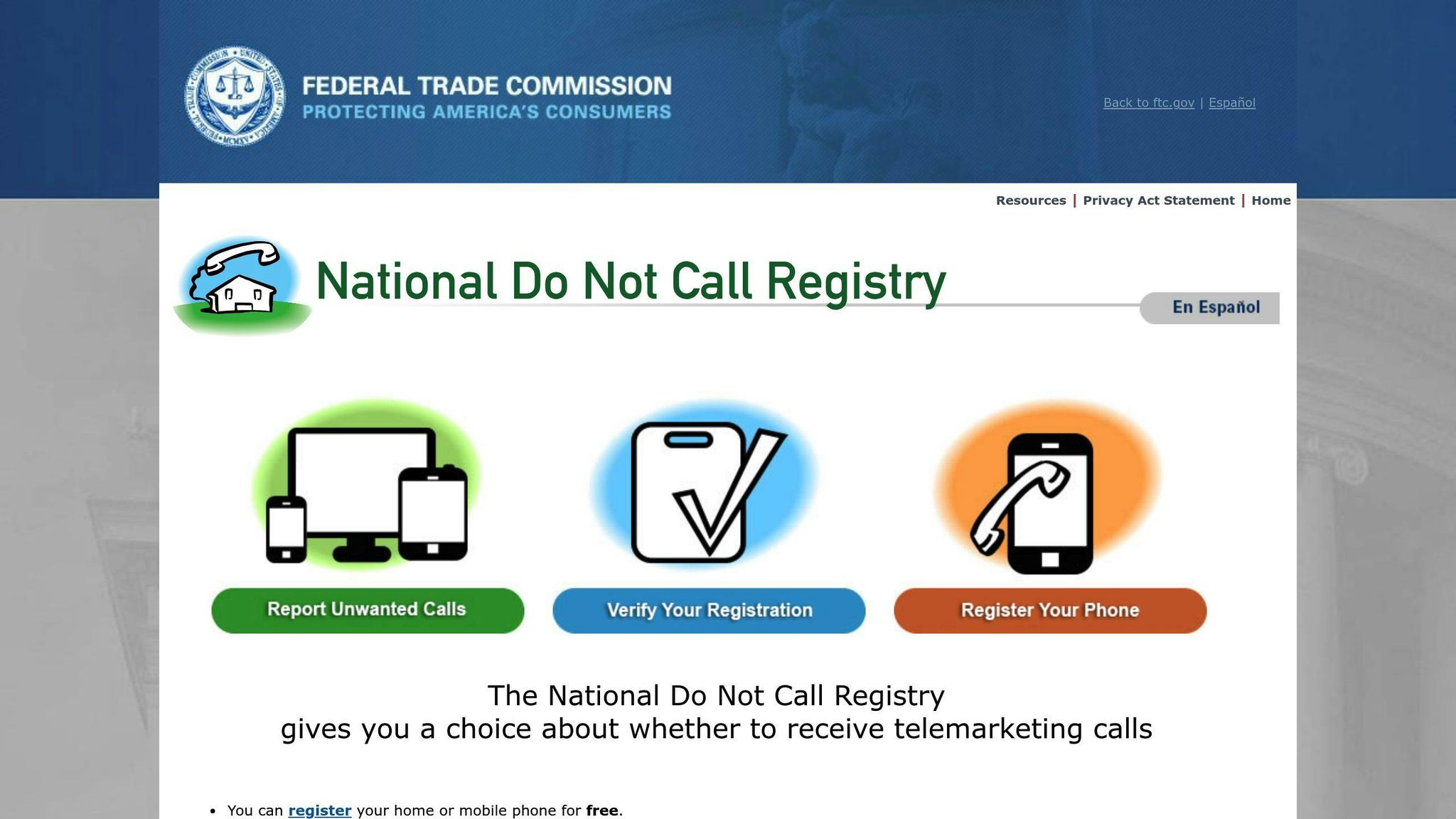
Tired of unwanted calls? Here’s how to fight back: The National Do Not Call Registry and reporting violations are two key tools to stop telemarketing calls. The Registry helps block legal telemarketers, while reporting violations targets illegal and scam calls. Together, they offer a strong defense against intrusive telemarketing.
Key Points:
- Do Not Call Registry: Blocks legal telemarketing calls; over 249.5 million numbers registered in 2023.
- Reporting Violations: Targets illegal calls, enforces fines up to $10,000 per call, and helps stop repeat offenders.
- Challenges: Scammers bypass rules using robocalls, caller ID spoofing, and operating outside FTC jurisdiction.
Quick Comparison:
| Feature | Do Not Call Registry | Reporting Violations |
|---|---|---|
| Purpose | Blocks legal telemarketers | Targets illegal/scam calls |
| Timing | Protection starts in 31 days | Immediate action |
| Scope | Legal telemarketers only | Covers all unwanted calls |
| Enforcement | FTC penalties | Fines, cease & desist letters |
| User Action | One-time registration | Ongoing reporting |
Best Approach? Use both: Register your number to block legal calls and report violations to stop illegal ones. Reporting helps enforce penalties and holds offenders accountable.
Do Not Call Registry: How It Works and Its Challenges
How the Do Not Call Registry Blocks Calls
The FTC’s Do Not Call Registry gives consumers a way to reduce telemarketing calls by letting them register their phone numbers. Once registered, telemarketers are required to remove those numbers from their call lists within 31 days. Numbers stay on the registry indefinitely unless they are disconnected or reassigned. To keep the system accurate, the FTC updates the database regularly.
You can register your number either online or by phone. After registration, it takes up to 31 days for the protection to kick in. The registry stands out because your number remains listed indefinitely, unless changes like disconnections occur. The FTC also purges outdated entries several times a month to maintain reliability.
Challenges of the Do Not Call Registry
The registry’s success depends heavily on telemarketers following the rules, but many find ways to bypass them. Some of the main challenges include:
- Scammers operating from outside the FTC’s jurisdiction
- Caller ID spoofing and automated robocall systems
- Companies using outdated call lists
- Limited enforcement resources to address violations
These issues make it clear that additional steps, such as reporting violations, are necessary to tackle persistent offenders.
Statistics on the Do Not Call Registry
Recent figures show the registry’s wide reach but also highlight ongoing problems. As of fiscal year 2023, there are 249.5 million active registrations.
Despite this, the number of complaints remains high. In FY 2023, the FTC received over 2 million complaints about unwanted calls, with robocalls making up the majority of these violations.
| Registry Performance Indicators (FY 2023) | Statistics |
|---|---|
| Active Registrations | 249.5 million |
| Complaint Volume | Over 2 million |
| Primary Violation Type | Robocalls |
With these challenges in mind, many consumers take matters into their own hands by reporting violations to help curb unwanted calls.
Reporting Telemarketing Violations: Steps and Advantages
Steps to Report Violations
To report telemarketing violations, you’ll need to provide details about the caller, specifics of the call, and confirm your Do Not Call Registry status. Platforms like ReportTelemarketer.com make this process easier by investigating complaints, sending cease-and-desist letters, and filing reports – all without charging users.
How Reporting Stops Illegal Calls
Reporting plays a key role in tackling illegal telemarketing. When consumers document and report violations, they initiate enforcement actions that can result in hefty penalties. These actions rely heavily on individuals stepping forward, making consumer participation essential for success.
| Enforcement Action | Potential Outcome |
|---|---|
| Legal Proceedings | Fines up to $10,000 per call |
| Civil Lawsuits | Compensation up to $1,500 per violation |
Why Reporting Telemarketers Helps
Filing reports against telemarketers does more than just stop illegal calls. It helps gather evidence for enforcement, shields vulnerable individuals, and allows consumers to seek compensation under the TCPA. For each violation, individuals can claim up to $500, and this amount can rise to $1,500 for intentional breaches.
On a broader scale, reporting creates public records of repeat offenders, supports regulatory updates, and strengthens overall consumer protection. These combined efforts enable authorities to better identify and shut down illegal telemarketing operations.
But how does reporting compare to relying on the Do Not Call Registry? Let’s dive into that next.
Do Not Call Registry vs. Reporting Violations: A Comparison
Comparison Table: Features and Results
Here’s a breakdown of how the Do Not Call Registry and reporting violations differ in their approach to tackling unwanted calls:
| Feature | Do Not Call Registry | Reporting Violations |
|---|---|---|
| Primary Purpose | Blocks legal telemarketing calls | Targets illegal and scam calls |
| Process and Timing | Requires registration, activates in 31 days | Initiates immediate investigations |
| Protection Scope | Focuses on legal telemarketers | Covers all unwanted calls |
| Enforcement Method | Complaints lead to FTC penalties | Legal actions, cease and desist letters |
| Success Metrics | 249.5M active registrations (FY 2023) | Reduces repeat violations |
| User Requirements | One-time sign-up | Ongoing reporting of violations |
What the Comparison Shows
This comparison highlights how these tools work together to protect consumers. The Do Not Call Registry, with 249.5 million active registrations, effectively blocks legal telemarketers but doesn’t stop illegal or scam calls. On the other hand, reporting violations actively targets rule-breakers and enforces penalties.
Here’s how the two methods complement each other:
- Registering on the Do Not Call Registry helps block calls from legitimate telemarketers.
- Reporting violations through platforms like ReportTelemarketer.com addresses illegal and scam calls.
- Enforcement actions ensure violators face consequences, including fines of up to $10,000 per call.
sbb-itb-a8d93e1
The Do Not Call Registry and the Rules for Telemarketers
Conclusion: Picking the Best Way to Stop Telemarketing Calls
Stopping unwanted telemarketing calls requires a mix of proactive measures and follow-through. Even with millions of numbers registered, complaints about these calls remain a problem, showing that more steps are needed.
What Works Best? A two-step approach:
- Step 1: Register your number with the National Do Not Call Registry. This helps block calls from legitimate telemarketers. However, it won’t stop illegal callers or scammers who often find ways around the system.
- Step 2: Report violations as they happen. Tools like ReportTelemarketer.com can help by investigating and taking legal action. With the TRACED Act increasing penalties for offenders, these reports carry real weight.
Why Act Now?
Signing up for the Do Not Call Registry is an important first move, but it’s not enough on its own. Reporting violations plays a key role in tackling illegal calls and holding offenders accountable. Every report helps strengthen enforcement and shields others from similar issues.
This combined strategy offers a strong defense:
- The Registry filters out legitimate telemarketers.
- Reporting tools focus on those breaking the rules.
- Legal penalties discourage future violations.
FAQs
Is the National Do Not Call Registry effective?

The effectiveness of the National Do Not Call Registry varies. Here’s how it works:
- It reduces calls from telemarketers who comply with federal rules.
- It doesn’t prevent calls from scammers who disregard the law.
- While it restricts numbers, it doesn’t actively block calls.
Affordable technology makes it easy for scammers worldwide to sidestep enforcement efforts. Although the Registry has its shortcomings, reporting violations can be a more direct way to address illegal calls.
Does reporting unwanted calls do anything?
Yes, reporting unwanted calls is crucial for tackling illegal telemarketing. Agencies like the FTC and FCC rely on these reports to:
- Adjust telemarketing rules and regulations.
- Take legal action against offenders.
- Monitor illegal calling trends.
- Build cases against non-compliant telemarketers.
For example, the FTC received over 2 million complaints about Do Not Call violations, with most involving robocalls. These reports have led to enforcement actions, including penalties of up to $10,000 per call for deliberate violations under the TRACED Act. Reporting, alongside the Registry, helps crack down on illegal operators and improve consumer protection.